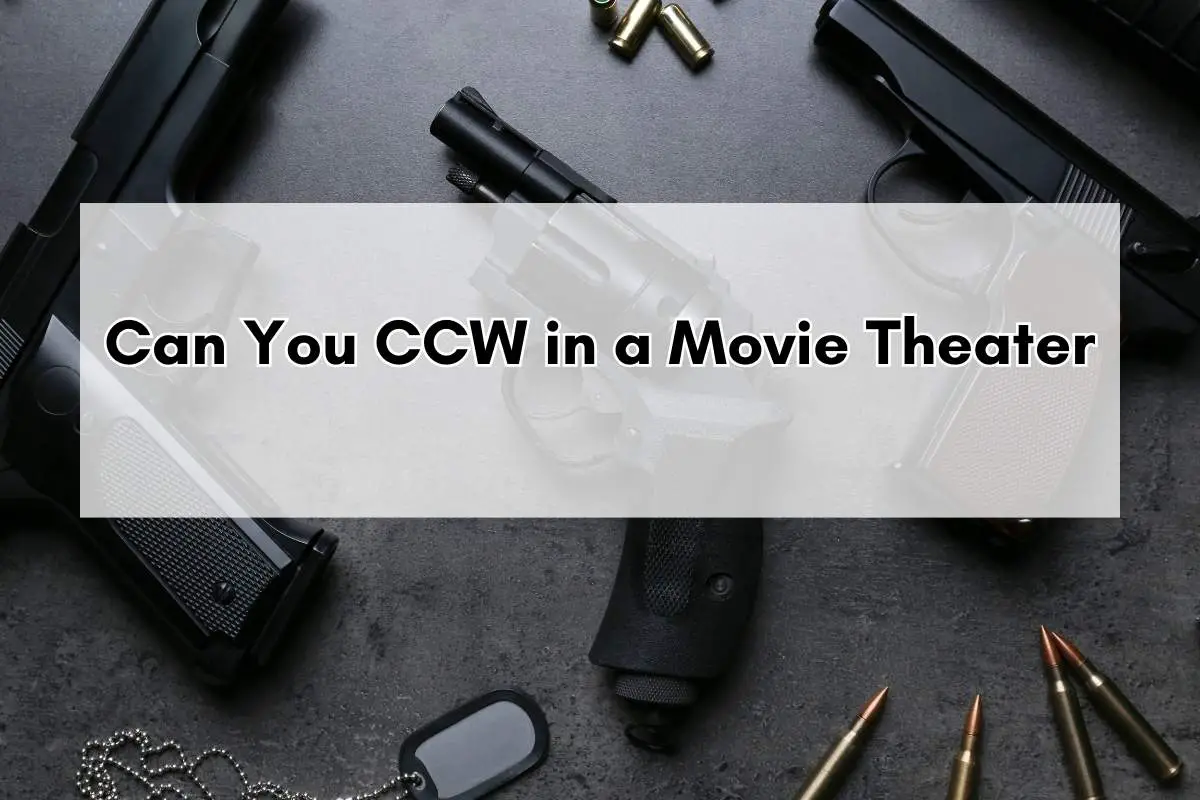Going to the movies is a popular pastime, but for those with concealed carry permits, it raises questions about where they can legally bring their firearms. Many wonder if they can carry their concealed weapon into a movie theater. The answer isn’t simple and depends on several factors.
Laws about carrying concealed weapons in movie theaters vary by state and even by individual theater policies. Some states allow concealed carry in theaters, while others prohibit it. Theaters can also set their own rules about firearms on their property. It’s important to know both your state laws and the policies of the specific theater you plan to visit.
People who want to carry their concealed weapon in a theater should check local laws first. They should also look for signs at the theater entrance that might prohibit weapons. Even if it’s legal in your state, a theater can still ask you to leave if they find out you’re carrying a gun. Breaking these rules could lead to legal trouble.
Key Takeaways
- Concealed carry laws for movie theaters differ by state and theater
- Check local laws and theater policies before bringing a concealed weapon
- Violating concealed carry rules can have legal consequences
Overview of Concealed Carry Laws
Gun laws in the United States vary at the federal and state levels. Movie theaters and other private businesses also have their own rules about weapons on their property.
Federal Firearm Laws
Federal laws set the basic rules for gun ownership in the US. The Gun Control Act of 1968 bans felons from having guns. It also sets age limits for buying guns. The Brady Act started background checks for gun sales.
The Law Enforcement Officers Safety Act lets some current and former police carry guns anywhere. But this doesn’t apply to regular citizens with concealed carry permits.
Federal law doesn’t say much about carrying guns in specific places like movie theaters. Those rules are mostly set by states and businesses.
State-Specific CCW Regulations
Laws for concealed carry vary by state. Some states let anyone carry a hidden gun. Others require a permit. A few states don’t allow concealed carry at all.
Some states ban guns in certain places like schools or government buildings. But many don’t mention movie theaters.
To carry legally, you need to know your state’s laws. This includes:
- If you need a permit
- Where you can and can’t carry
- If businesses can ban guns
Always check the latest laws. They can change often.
Private Property and Business Owners’ Rights
Movie theaters are private businesses. In most states, they can choose to allow or ban guns on their property. Many big theater chains don’t allow weapons.
If a business bans guns, they usually put up signs. You should look for these when you enter. If you see one, you can’t carry your gun inside.
If a theater asks you to leave because you have a gun, you must go. Staying could be trespassing. This is true even if you have a valid permit.
Some states give extra weight to “No Guns” signs. In these places, ignoring the sign might be illegal.
Understanding CCW Permissions in Movie Theaters
Concealed carry policies in movie theaters can be complex. Laws and individual theater rules affect whether firearms are allowed. Knowing the rules is key to avoiding legal trouble.
Theater Policies on Concealed Firearms
Many movie theaters have their own policies about firearms. Some ban all weapons, even with permits. Others may allow concealed carry if state law permits it.
Large chains often post “no weapons” signs. These signs can have legal weight in some states. Smaller theaters may have different rules.
It’s smart to check a theater’s policy before visiting. This info is often on their website or at the box office. When in doubt, calling ahead can prevent issues.
Legal Implications of Non-Compliance
Breaking concealed carry laws or theater policies can lead to serious consequences. Penalties may include:
- Fines
- Criminal charges
- Revocation of concealed carry permits
In some places, ignoring “no weapons” signs is a crime. Even if it’s not illegal, theaters can ask armed patrons to leave. Refusing to leave could result in trespassing charges.
Following both state laws and theater rules is crucial. This helps avoid legal problems and keeps everyone safe.
Concealed Carry Permit Requirements
Getting a concealed carry permit involves meeting specific criteria and completing required steps. These requirements aim to ensure permit holders can safely and responsibly carry firearms in public.
Eligibility and Background Checks
To get a concealed carry permit, applicants must meet certain eligibility standards. Most states require applicants to be at least 21 years old and legally allowed to own firearms.
Applicants need to pass a thorough background check. This check looks for criminal history, mental health issues, and substance abuse problems. Some states have additional requirements, like being a legal resident or having a clean driving record.
The background check process often includes fingerprinting. Law enforcement agencies use this to verify the applicant’s identity and check for any criminal records.
Training and Education Requirements
Most states require concealed carry permit applicants to complete firearms training. This training typically covers gun safety, proper handling, and relevant laws.
The training usually includes both classroom instruction and hands-on practice. Topics often covered are:
- Safe firearm storage
- Conflict de-escalation
- Use of force laws
- Shooting techniques
Some states require applicants to demonstrate shooting proficiency. This may involve passing a practical test at a shooting range.
Training requirements vary by state. Some mandate several hours of instruction, while others have more basic requirements. Applicants should check their local laws for specific details.
Safety Considerations for CCW in Public Spaces
Carrying a concealed weapon in public spaces like movie theaters requires careful attention to safety practices. Key areas to focus on include maintaining situational awareness and proper firearm handling and storage.
Situation Awareness
Carrying concealed in public demands constant vigilance. CCW holders must stay alert to their surroundings at all times. This includes monitoring the behavior of other people nearby.
In a movie theater, it’s important to know the exits. Checking for potential escape routes when entering can be helpful. During the movie, remaining aware of movements around you is crucial.
Avoiding confrontations is a top priority. CCW holders should aim to de-escalate tense situations whenever possible. Walking away from potential conflicts is often the safest choice.
Firearm Handling and Storage
Proper firearm handling is essential for safety. The gun should remain holstered unless absolutely necessary. Adjusting or touching the weapon in public can draw unwanted attention.
Secure holsters are a must. They keep the firearm in place and prevent accidental discharge. The trigger should always be fully covered by the holster.
When not carried, firearms must be stored safely. Movie theaters may have specific policies about weapons on their premises. Following these rules is important for legal and safety reasons.
If a theater doesn’t allow firearms, having a secure storage option in your vehicle is crucial. A locked container or car safe can provide temporary storage while attending the movie.
Legal Consequences of CCW Violations
Carrying a concealed weapon in a movie theater without proper authorization can lead to serious legal troubles. The penalties vary based on state laws and the specific circumstances of the violation.
Penalties for Unlawful Carrying
Violating concealed carry laws can result in severe consequences. In many states, unlawful carrying in a prohibited area is a misdemeanor offense. Penalties may include:
• Fines ranging from $500 to $5,000
• Jail time of up to 1 year
• Suspension or revocation of concealed carry permit
• Probation or community service
Repeat offenses often lead to harsher punishments. Some states classify certain violations as felonies, especially if the incident occurs in sensitive locations like schools or government buildings.
Defense of Self and Others
While carrying a concealed weapon in a movie theater may be illegal, using it for self-defense could potentially be justified under certain circumstances. Key factors include:
• Immediate threat of death or serious bodily harm
• No safe retreat options available
• Proportional use of force
Laws regarding self-defense vary by state. Some states have “Stand Your Ground” laws that remove the duty to retreat before using force. Others require attempts to retreat if safe to do so.
Courts consider the totality of circumstances when evaluating self-defense claims. Even if justified, using a weapon carried illegally may still result in weapons charges.
Reciprocity and Travel with a Concealed Weapon
Traveling with a concealed weapon requires careful planning and knowledge of state laws. CCW holders must understand reciprocity agreements and interstate travel rules to stay legal.
Interstate Travel Considerations
When traveling between states, CCW permit holders need to research gun laws carefully. The federal Safe Passage provision allows transport of unloaded, locked firearms in vehicles. But local laws still apply when stopping.
Travelers should keep guns unloaded and locked in the trunk or a separate container. Ammunition must be stored separately. It’s wise to avoid unnecessary stops in non-reciprocating states.
Having a valid permit and government ID is crucial. Drivers should be prepared to inform officers about firearms if stopped.
CCW Reciprocity Agreements
CCW reciprocity agreements allow permit holders to carry concealed in other states. These vary widely, so checking current laws is vital before traveling.
Some states have broad reciprocity, honoring many out-of-state permits. Others are more restrictive or don’t recognize any outside permits.
Permit holders can use online reciprocity maps to check which states honor their license. It’s important to review specific restrictions in each state.
Reciprocity can change, so verifying information close to travel dates is recommended. Carrying proof of permit and following all local laws is essential.
Frequently Asked Questions
Concealed carry laws for movie theaters vary widely between states. Some allow it with restrictions, while others prohibit it entirely. Let’s look at the specifics for several states.
Is it legal to conceal carry in a movie theater in certain states?
Yes, some states allow concealed carry in movie theaters. But rules differ greatly. Many theaters have their own policies banning firearms, even where state law permits it.
Carriers should check both state laws and individual theater policies. Breaking rules can lead to serious consequences.
Does state law in Louisiana permit carrying a concealed weapon in a movie theater?
Louisiana allows concealed carry in movie theaters for permit holders. But private businesses can still prohibit weapons on their property.
Carriers must follow any posted signs banning firearms. Violating a theater’s policy could result in trespassing charges.
Are there any restrictions on carrying a concealed weapon in a movie theater in Ohio?
Ohio law allows concealed carry in movie theaters for license holders. However, individual theaters may still prohibit weapons on their premises.
Carriers should look for posted signs at theater entrances. Respecting private property rights is important for responsible gun owners.
What are the regulations for concealed carry in movie theaters in Georgia?
Georgia permits concealed carry in movie theaters for license holders. But like other states, private businesses can restrict firearms on their property.
Carriers should check for posted policies at each theater. Following all rules helps ensure public safety and protect carry rights.
How do state laws in Florida affect concealed carrying in movie theaters?
Florida allows concealed carry in movie theaters for permit holders. But theaters can still ban firearms as private businesses.
Many national chains prohibit weapons in all locations. Carriers should always check policies before entering.
Are individuals allowed to conceal carry in a movie theater in California?
California generally prohibits carrying concealed firearms in public places like movie theaters. There are very limited exceptions for specific license holders.
Most people cannot legally carry in California theaters. Violations can result in criminal charges.

